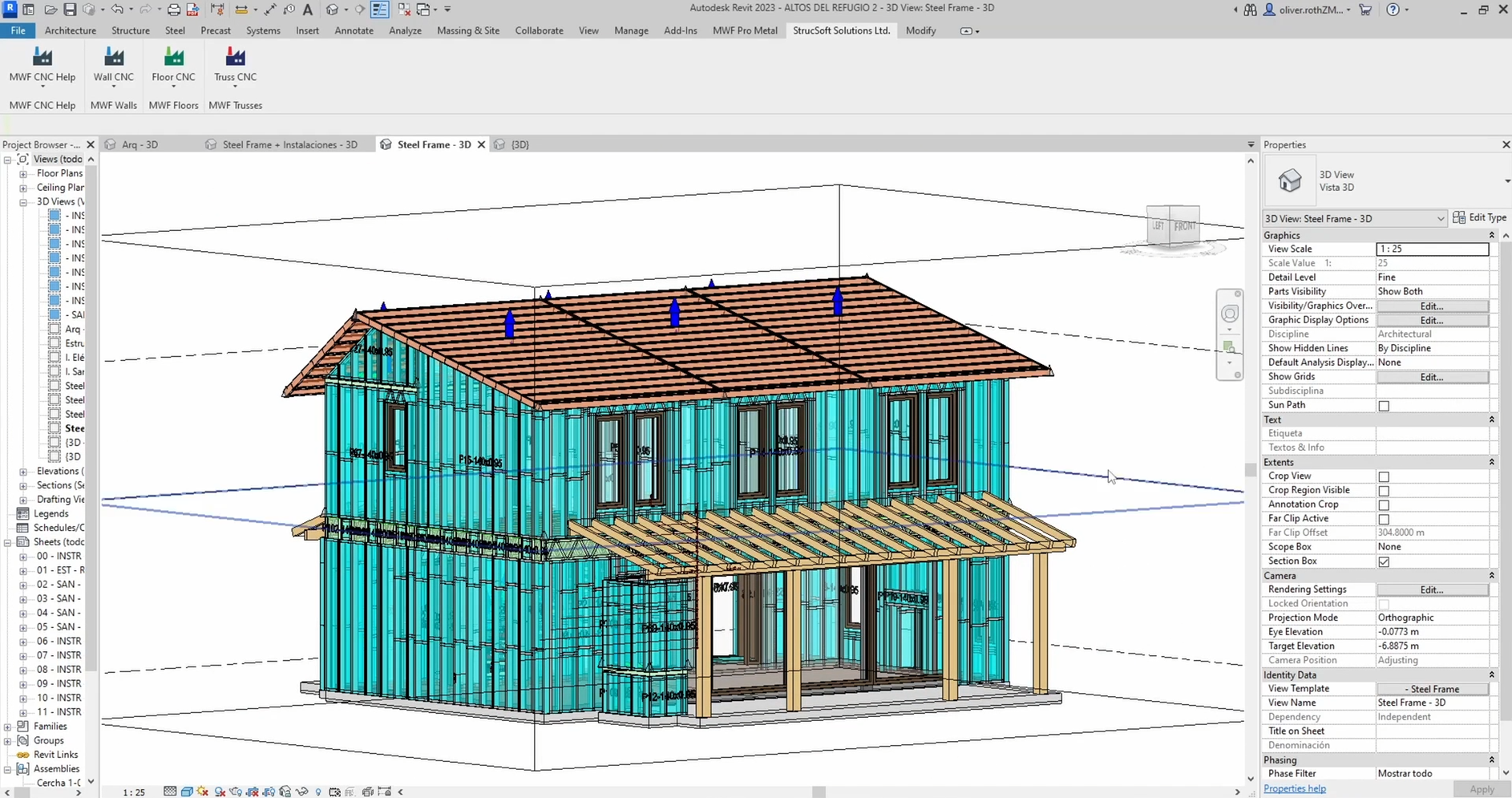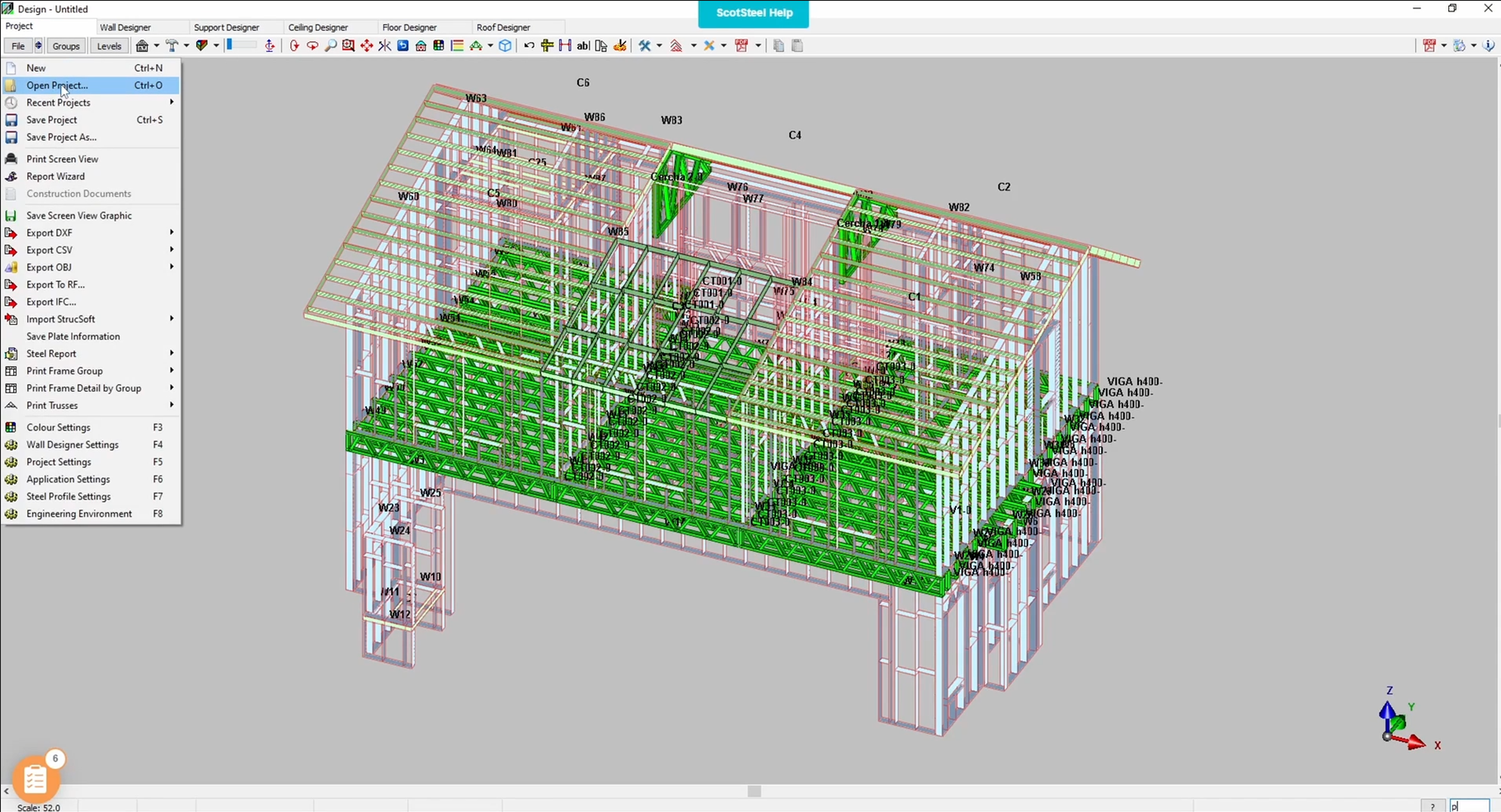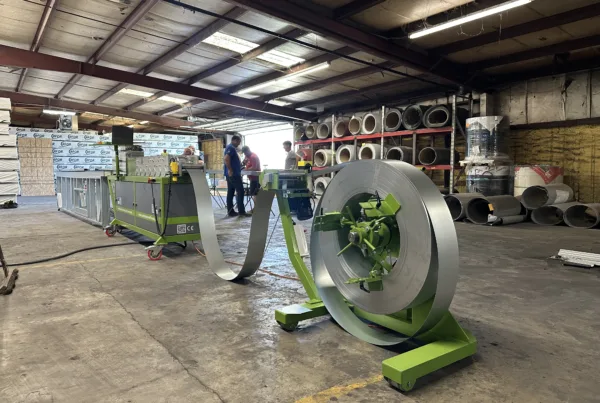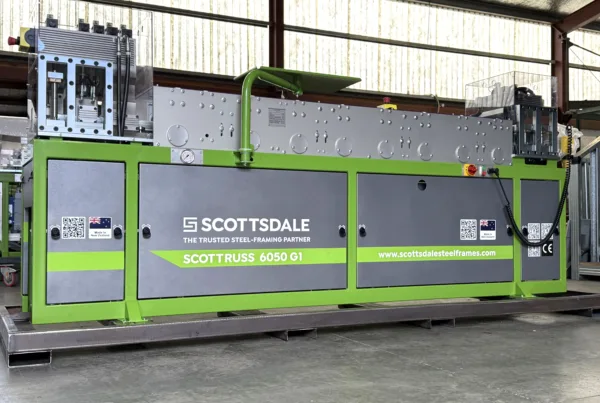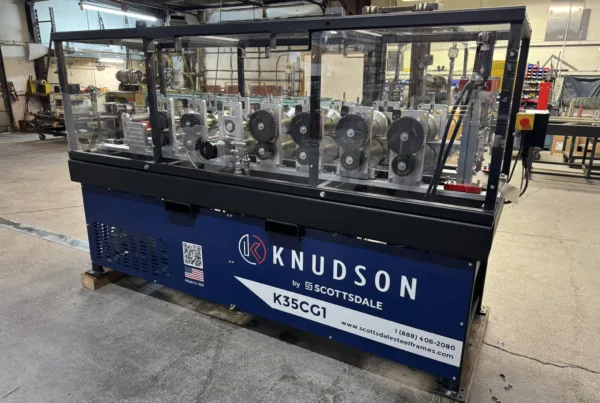This article describes various components within the Scottsdale ecosystem, focusing on steel framing machine systems, rollforming equipment, and software.
The Scottsdale ecosystem has two major streams in its product offerings. The hardware stream includes rollforming machinery, decoilers, and associated components for manufacturing cold-formed steel profiles of various dimensions to cater to different parts of the world.
The software stream includes detailing, engineering, rollforming control, and layout generation software suites that seamlessly integrate with Scottsdale roll formers, facilitating the rapid production of cold-formed steel buildings of various sizes and shapes worldwide.
Rollformers
Scottsdale LGS/CFS Steel Framing Systems
Scottsdale offers two specialized roll former steel framing systems. The Scotpanel series of roll formers are capable of producing the traditional C-section studs while the Scottruss series of roll formers produces Top Hat sections of various dimensions aimed at high-performance steel truss applications. The Scottsdale series of roll formers are primarily used in the construction of low to mid-rise residential projects around the globe but can also be successfully deployed in many other contexts, including commercial construction, drywall and curtainwall metal stud framing, industrial applications, and much more. The key advantage of Scotpanel steel framing systems is the ability to quickly produce steel framed panelized assemblies. Detailed information and real-world applications for these machines are presented below.
Scotpanel series includes the following:
On the other hand, the truss series of roll formers include the following
ScotPanel: Intelligent Panel Framing System
ScotPanel series of roll formers are equipped to produce C-section profiles as shown in the image.
ScotPanel formers can roll C-section profiles of the following configurations
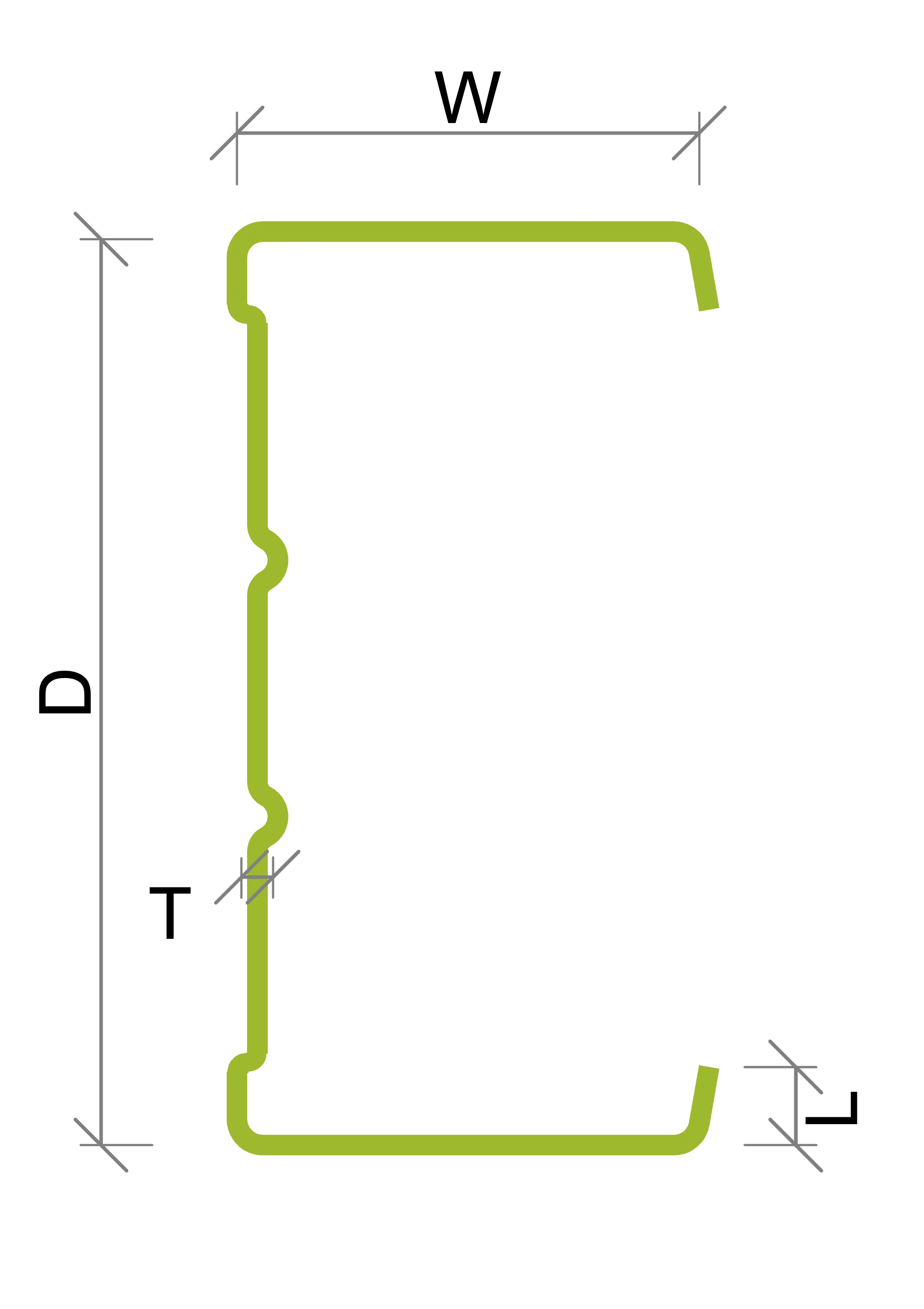
Table showing ScotPanel roll former series and corresponding specifications in Metric
| Description | 5-Series | 7-Series | 8-Series | ||||
| 5090 | 50140 | 7063 | 7070 | 7090 | 7140 | 8140 | |
| Depth (D) [mm] | 90 | 140 | 63 | 70 | 90 | 140 | 140 |
| Width (W) [mm] | 46 | 46 | 37 | 37 | 37 | 37 | 46 |
| Lip length (L) [mm] | 10 | 10 | 7 | 7 | 7 | 7 | 10 |
| Radius (R) [mm] | 2 | ||||||
| Thickness (T) [mm] | 0.55 to 1.15 | 1 to 1.6 | |||||
Table showing ScotPanel roll former series and corresponding specifications in Imperial
| Description | 5-Series | 7-Series | 8-Series | ||||
| 5090 | 50140 | 7063 | 7070 | 7090 | 7140 | 8140 | |
| Depth (D) [in] | 3.54 | 5.51 | 2.48 | 2.76 | 3.54 | 5.51 | 5.51 |
| Width (W) [in] | 1.81 | 1.81 | 1.46 | 1.46 | 1.46 | 1.46 | 1.81 |
| Lip length (L) [in] | 0.39 | 0.39 | 0.28 | 0.28 | 0.28 | 0.28 | 0.39 |
| Radius (R) [in] | 0.078 | ||||||
| Thickness (T) [Ga] | 24 to 18 | 20 to 16 | |||||
- ScotPanel series of roll formers that produces C-section are optimised for the web dimensions with additional web stiffeners placed at strategic locations.
- Additional web stiffeners result in a 15% increase in the axial compression capacity when used as wall studs in comparison with C-sections of similar dimensions without the additional web stiffeners.
- Lips in the C-section help in reducing the distortional buckling failure thereby resulting in increased capacities. The distortional mode of failure can be a dominant failure mode in certain cold-formed steel profile which has been addressed within the Scottsdale profiles.
- The automated swage and notch operations within these machines facilitate easier linear and staggered connection of the noggings for better in-plane restraints of the studs within a wall panel.
- Specialized end bearing tool option is available to eliminating the contact distance between the stud and the bottom plates thereby overcoming the connection failures. This helps in achieving greater connection capacities of a wall system as bearing of studs takes precedence over the connectors resulting in greater design capacities with thinner steel in comparison with the competition.
The ScotPanel series of roll formers have the capabilities to manufacture panels of the following type
- Wall
- Roof
- Ceiling
- Support frames
All the above-mentioned can be manufactured with the same machine using the same coil width. It can even roll roof and floor trusses for shorter spans. The roll formers have the capabilities to roll lipped channel section as thin as 0.55 mm which can be used in many non-load bearing to mild load bearing applications within the construction industry.
Ideally these profiles can be used in construction of a variety of structures. Some of the common use cases are mentioned below.
- Single and double storey residential constructions where roof and floor trusses are of shorter spans. Both load bearing and non-load bearing walls can be rolled out of the same machine.
- Town houses.
- Commercial structures up to 5 storeys.
- Childcare centres.
- Granny flats.
- Modular buildings and offsite structures.
- Prefabricated internal office fit outs.
- Internal and external partitions in mid- and high-rise structures.
- Garage sheds and carports.
- Small to medium size extensions on any existing residential structures.
- Solar panel support frames.
- Site offices.
- Temporary disaster relief housing projects.
- Bathroom pods.
- Temporary storage facilities.
ScotTruss: High-Performance Steel Truss Framing System
ScotTruss series of roll formers are equipped to produce top-hat section profiles as shown below.

ScotTruss roll formers can roll Hat section profiles of the following configurations
- 6050 and 6075
Table showing ScotTruss roll former series and corresponding specifications in Metric
| Description | 6050 | 6075 |
| Depth (D) [mm] | 51 | 77 |
| Top Flange Width (W) [mm] | 40 | |
| Bottom Flange Width (W) [mm] | 14 | |
| Lip length (L) [mm] | 7 | |
| Radius (R) [mm] | 2 | |
| Thickness (T) [mm] | 0.55 to 1.15 | 0.95 to 1.6 |
Table showing ScotTruss roll former series and corresponding specifications in Imperial
| Description | 6050 | 6075 |
| Depth (D) [in] | 2 | 3 |
| Top Flange Width (W) [in] | 1.57 | |
| Bottom Flange Width (W) [in] | 0.55 | |
| Radius (R) [in] | 0.078 | |
| Lip length (L) [in] | 0.275 | |
| Thickness (T) [Ga] | 24 to 18 | 18 and 16 |
Some highlights of the specialized ScotTruss series of roll formers for the manufacturing of cold-formed steel trusses for residential and commercial applications are listed below
- Unlike the lipped channel sections, the top hat sections are placed about the strong (major) axis of the section geometry thereby making them more suitable for roof and floor truss applications to withstand higher bending moments induced on the truss top and bottom chord members.
- ScotTruss 6050 roll former can produce hat sections with a depth of 50 mm (2 in) which is well suited for residential and commercial applications.
- ScotTruss 6075 roll former can produce a deeper 77 mm (3 in) top hat sections with a greater bending capacity as a resultant of the deeper webs. This in turn can be used in the production of trusses for industrial structures with higher wind and snow loads.
- Top and bottom flanges along with the lip lengths are carefully sized in these profiles to avoid distortional buckling failures thereby resulting in superior member capacities.
- ScotTruss top hat sections uses proprietary bolted connections with further strengthening through nylon spacers. This results in a superior and stronger truss connection in comparison to screwed connections.
- Loosening effect typically found in connectors due to aging is addressed by the specially built locking nut for the bolts affirming superior performance within the truss system in all applications.
Ideally these profiles can be used in construction of a variety of structures. Some of the common use cases are mentioned below.
- Mezzanine floors with heavy loads and large spans
- Barn roof trusses
- Industrial roof trusses
- Residential roofs – New and restoration
- Roof and floor trusses in multilevel construction – Practically any truss shape
- Carport roofs
Knudson by Scottsdale Rollformers
Knudson by Scottsdale series of roll formers offer a variety of profiles and are listed below based on their use cases.
KFD Framemaker Series Rollforming Machines
The KFD series of roll formers are best suited for non-structural framing applications. The lipped and unlipped channel sections doesn’t carry an additional axial load apart from the self-weight of the cladding in general non-load bearing applications.
KFD series of roll formers include the following
Table showing KFD roll former series and corresponding specifications in Imperial
| Description | KFD Series |
| 2025 | |
| Depth (D) [in] | 1.63, 2.50, 3.63, 4.00, 6 |
| Width (W) [in] | 1.25 |
| Lip length (L) [in] | 0.191 |
| Thickness (T) [Ga] | 25 to 20 |
| Radius (R) [in] | 0.06 |
| Description | KFD Series |
| 2025 | |
| Depth (D) [mm] | 41.4, 63.5, 92.2, 101.6, 152.4 |
| Width (W) [mm] | 31.75 |
| Lip length (L) [mm] | 4.8514 |
| Thickness (T) [mm] | 0.4775 to 0.87884 |
| Radius (R) [mm] | 1.52 |
Some highlights of the profiles from the KFD series of roll formers are detailed below.
- Web stiffened profiles with return lips at strategic positions helping the installers to snap the lipped channel studs in to the unlipped tracks (top and bottom plates) with ease.
- The studs can be nested and boxed making it easier to frame near the opening areas where a closed face of the stud is necessary.
- Nesting of the sections in required areas results in higher capacities when needed.
Ideally these profiles can be used in construction of a variety of structures. Some of the common use cases are mentioned below.
- Internal load bearing and non-load bearing partitions.
- Office and shop fit outs.
- Facades
- Suspended ceilings
- Bulkheads
KFS Framemaker Series Rollforming Machines
The KFS series of roll formers are best suited for structural framing applications. The roll formers are equipped to produce lipped and unlipped channel sections for a variety of structural applications.
The KFS series of roll formers include the following.
Table showing KFS roll former series and corresponding specifications in Metric
| Description | KFS Series | ||
| 1218 | 1420 | 1622 | |
| Depth (D) [mm] | 152.4 to 304.8 | 91.948 to 304.8 | 88.9 to 203.2 |
| Width (W) [mm] | 38.1 to 63.5 | 41.275 to 63.5 | 41.275 to 63.5 |
| Lip length (L) [mm] | 15.875 | 12.7 to 15.875 | 12.7 to 15.875 |
| Thickness (T) [mm] | 1.43 to 2.58 | 0.79 to 1.81 | 0.79 to 1.81 |
| Radius (R) [mm] | 3.048 | 3.048 | 2.286 |
| Description | KFS Series | ||
| 1218 | 1420 | 1622 | |
| Depth (D) [in] | 6 to 12 | 3.62 to 12 | 3.5 to 8 |
| Width (W) [in] | 1.5 to 2.5 | 1.625 to 2.5 | 1.625 to 2.5 |
| Lip length (L) [in] | 0.625 | 0.5 to 0.625 | 0.5 to 0.625 |
| Thickness (T) [Ga] | 18 to 12 | 20 to 14 | 22 to 16 |
| Radius (R) [in] | 0.12 | 0.12 | 0.09 |
- The studs are made from lipped channel sections which adds additional compression and bending strength in compared to unlipped channel sections under load bearing applications
- The top and bottom plates are made from unlipped channel sections facilitating ease of installation
- The roll formers have the capabilities to punch holes for the connections, notch and swage at required locations for framing up any shape.
- Both panels and trusses can be manufactured out of the same roll former making it the most versatile machine series within the Knudson line up.
Ideally these profiles can be used in construction of a variety of structures. Some of the common use cases are mentioned below.
- Internal load bearing partitions
- Single and double storey residential constructions
- Town houses
- Commercial structures such as cafes, restaurants and hotels up to 10 storeys
- Childcare centers
- Granny flats
- Modular buildings and offsite structures
- Prefabricated internal office fit outs
- Garage sheds and carports
- Extensions on any existing residential structures
- Solar panel support frames
- Warehouses
- Site offices
- Temporary disaster relief housing projects
- Bathroom pods
- Temporary storage facilities
- Moment resisting frames and sheds
- High volume cold-formed steel framed production applications.
KSE Series Rollforming Machines
The KSE Series Knudson by Scottsdale rollforming equipment entails a variety of auxiliary rollforming and specialty steel framing equipment pieces beyond the traditional stud, track, truss, and panel machinery. These include wall and roof steel panel rollforming equipment, standing seam roof seamers, cassette rollformers for resilient and furring channels, and much more.
FrameExtend24 (FE24)
The latest addition in the Knudson series of roll formers is the FrameExtend24 (FE24).
The FrameExtend24(FE24) series of roll formers include the following
- EX7-090
- EX7-140
| Description | KFE Series |
| FE24 | |
| Depth (D) [mm] | 90 and 140 |
| Width (W) [mm] | 37 |
| Lip length (L) [mm] | 7.5 |
| Thickness (T) [mm] | 0.55 to 1.15 |
| Radius (R) [mm] | 2 |
Table showing KFE roll former series and corresponding specifications in Imperial
| Description | KFE Series |
| FE24 | |
| Depth (D) [in] | 3.54 to 5.51 |
| Width (W) [in] | 1.456 |
| Lip length (L) [in] | 0.295 |
| Thickness (T) [in] | 24 to 18 |
| Radius (R) [in] | 0.0787402 |
Some highlights of the Frame Extend24 are listed below
- The Extension Sleeve Unit is an auxiliary rollforming machine that reduces a pre-formed C-section’s dimensions by 2.5mm in both web width and flange height.
- The machine creates a smaller C-section that fits inside the original part, allowing for the creation of telescoping/extendable studs or boxed beam sections.
- Boxed beam sections are suitable for posts, traditional headers, and other applications requiring additional strength or a closed member.
- Ideal for wall and ceiling contractors, it minimizes wasted time and material by addressing uncertain as-built soffit height dimensions.
- Compatible with both load-bearing and non-load-bearing applications.
- Optimized for Scottsdale ICC-ES approved shapes.
- Available globally with customization for local power requirements.
KR18
Knudson KR18 is a single profile roll former capable of making panel section as shown below.
Table showing KR18 roll former series and corresponding specifications in Metric
| Description | KR Series |
| KR18 | |
| Width (W) [mm] | 18 |
| Height (H) [mm] | 2.5 |
| Description | KR Series |
| KR18 | |
| Width (W) [in] | 457.2 |
| Height (H) [in] | 63.5 |
Some highlights of the KR18 are stated below
- Web stiffeners along the web to achieve longer panel spans
- Stiffened lips for easier clipping to adjacent panels
- The stiffened lips also provide excellent buckling capacity, thereby eliminating distortions during installation and service life of the panels.
Ideal applications of the section include the following
- Roof panel
- Ceiling panel
- Facades
KR24
Knudson KR24 is a multi-profile roll former capable of making panel section as shown below.
Table showing KR24 roll former series and corresponding specifications in Metric
| Description | KR Series |
| KR24 | |
| Width (W) [mm] | 304.8 to 609.6 |
| Height (H) [mm] | 38.1 to 50.8 |
Table showing KR24 roll former series and corresponding specifications in Imperial
| Description | KR Series |
| KR24 | |
| Width (W) [in] | 12 to 24 |
| Height (H) [in] | 1.5 to 2 |
Some highlights of the KR24 are stated below
- Web stiffeners along the web to achieve longer panel spans
- Stiffened lips for easier clipping to adjacent panels
- Flat bottom for various architectural applications
- The stiffened lips/legs of varying height also provide excellent buckling capacity, thereby eliminating distortions during installation and service life of the panels.
- Unlipped U panel option
Ideal applications of the section include the following
- Roof panel
- Ceiling panel
- Facades with standing seams
K35C
The K35C series includes the cassette series of roll formers where a single machine can roll multiple profiles by using various cassettes as shown below. Various dimensions and thickness can be rolled based on the profile shape.
Some of the common use cases are mentioned below.
- Roof and ceiling battens
- Wall battens
- Standing seam roof sheathing
- Standing seam external panel sheathing
- Facades for shops and office spaces
Software Suite: Steel Framing Design, CFS/LGS Structural Engineering, CNC Rollforming Software
Product offering from the software stream are listed and detailed below.
ScotSteel: LGS/CFS Comprehensive Steel Frame Design Suite
ScotSteel is a bespoke 3D software that facilitates the design and engineering of cold-formed steel sections within the Scottsdale ecosystem. It boasts advanced tools for rapid drafting and engineering of cold-formed steel structures with ease. The built-in import tools make it seamless to trace framing drawings from architectural plans, while the export tools help with precise quantity take-offs.
ScotEngineering: Advanced truss engineering software
ScotEngineering is an add-on module to ScotSteel that also features detailed truss and panel engineering reports, making the engineering sign-off process fast and efficient. ScotEngineering uses advanced Finite Element (FE) analysis to analyse and design any arbitrary cold-formed steel panel generated within the ScotSteel design software. It also offers automated load generation, structural analysis and member checking functionality as per various country code of practice.
ScotSeismic: Powerful base shear calculation tool
ScotSeismic is a new add-on within the ScotSteel design software to calculate the shear loading of the building for each level in accordance with ASCE 7-16. This includes the base shear and sum level shear for the entire project. The tool is equipped with automatic integration with the USGS database to extract the necessary information to compute the shear based on the latitude and longitude of the project. These derived forces can then be used for the structural analysis within ScotSteel or other structural analysis software.
ScotSim: Robust jointing simulation tool for cold-formed steel
ScotSim is a jointing simulation software designed to precisely locate and place connection details within the cold-formed steel frame models produced by ScotSteel. This ensures accurate placement of connection details in both C- and Hat section profiles for making trusses and panels. All operations conducted by the roll formers such as cut, notch, swage, flatten and hole punch to produce trusses and panels can be visualized within the ScotSim software as part of the quality control procedure before production. This ensures millimetre-level precision in the production of trusses and panels.
ScotLayout: Automated layout preparation software
ScotLayout is an automated layout preparation software that transforms 3D models and engineering details from the ScotSteel model into 2D PDF printouts. Plan, section, and elevation views from the ScotSteel 3D model can be selected at various locations along the project and printed as neatly split layouts across multiple PDF pages. Detailed bill of materials (BOM) and engineering reports can also be generated, helping in the submission of the engineering package for sign-offs and providing construction issue drawing sets for the assembly team on-site.
ScotRF: Rollformer production management software
The ultimate rollforming and production management software within the Scottsdale suite of applications includes ScotRF-Truss and ScotRF-Panel. ScotRF-Truss is used for the production of Hat section profiles, while ScotRF-Panel facilitates the production of C-section profiles. Cold-formed steel frame models generated within the ScotSteel design software can be sent directly to ScotRF for direct communication with the roll formers, enabling a seamless integration between the software and roll formers for the production of trusses and panels.
ScotStruct: Advanced cold-formed steel engineering software
The latest addition to the Scottsdale suite of software is the ScotStruct application. This software is a standalone engineering application that incorporates the latest engineering methods for the structural analysis and design of cold-formed steel structures using the Direct Strength Method (DSM). It features multiple modules for designing bearing walls, shear walls, bracing members, lintels, and more. Additionally, project design and environmental information from existing ScotSteel models can also be seamlessly transferred to the new ScotStruct software, facilitating the engineering of any complex cold-formed steel structure with ease.
Integrations
The ScotSteel suite of software have good integrations with other design and engineering software packages to facilitate the ease of manufacturing Scottsdale profiles and are listed below.
- Importing DXF layouts for rapid framing within the design software
- One click export of framing model to 2D and 3D DXF for easy view in other software packages
- Once click export to IFC for clash detection and BIM project management during the construction process
- Direct export to the ScotRF framing software for seamless rolling with tight integration and interoperability
- Engineering geometry export to other structural analysis packages for complex structural analysis. Section, material, restraint and member release data exported as part of process resulting in significant saving in modelling the geometry in external tools.
From the Knudson roll former perspective all machinery can integrated with Autodesk Revit for design and engineering using the MWF Pro metal plugin. Alternatively, Vertex BD can be also used in creation of the framing model from architectural plans. The completed design can then be sent to the Knudson roll formers through the ONYX cloud management system which have numerous benefits as follows:
- Cloud-based tool for production management for the entire project offering seamless integration with the design and the manufacturing process
- Optimised rolling using sequencing and scheduling the rolling process as per project needs
- Panel stack, sort and bundle management for ease of inventory control and transportation
The attached flowchart illustrates ways through which Autodesk Revit is used in the design and production of cold-formed steel frames with the Knudson and Scottsdale roll formers.
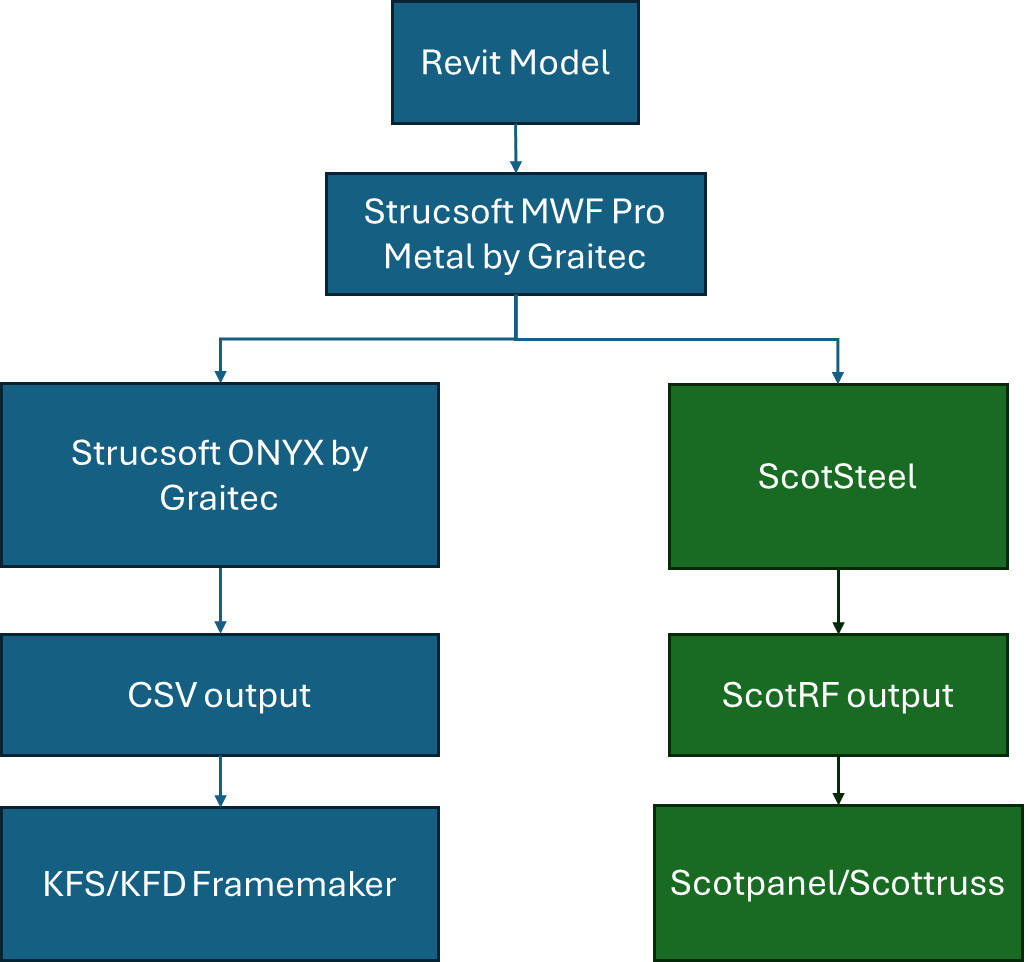 |
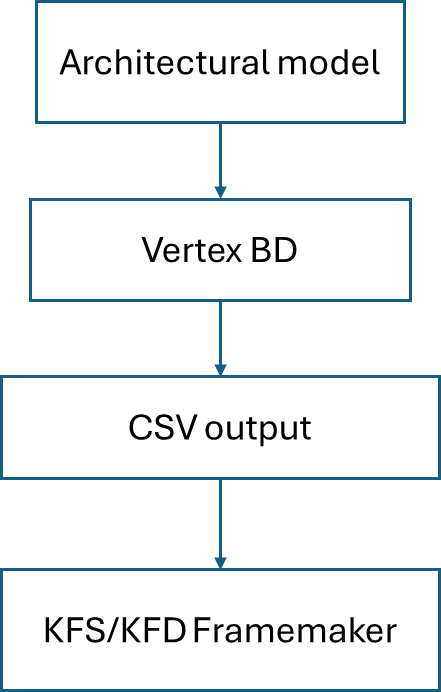 |
| Revit + Strucsoft MWF Pro Metal for Knudson and Scottsdale profiles | Vertex BD for Knudson profiles |
Once the architectural plans are available, the users can then convert the architectural plans into structural framing model with the help Vertex BD OR Strucsoft MWF Pro metal by Graitec
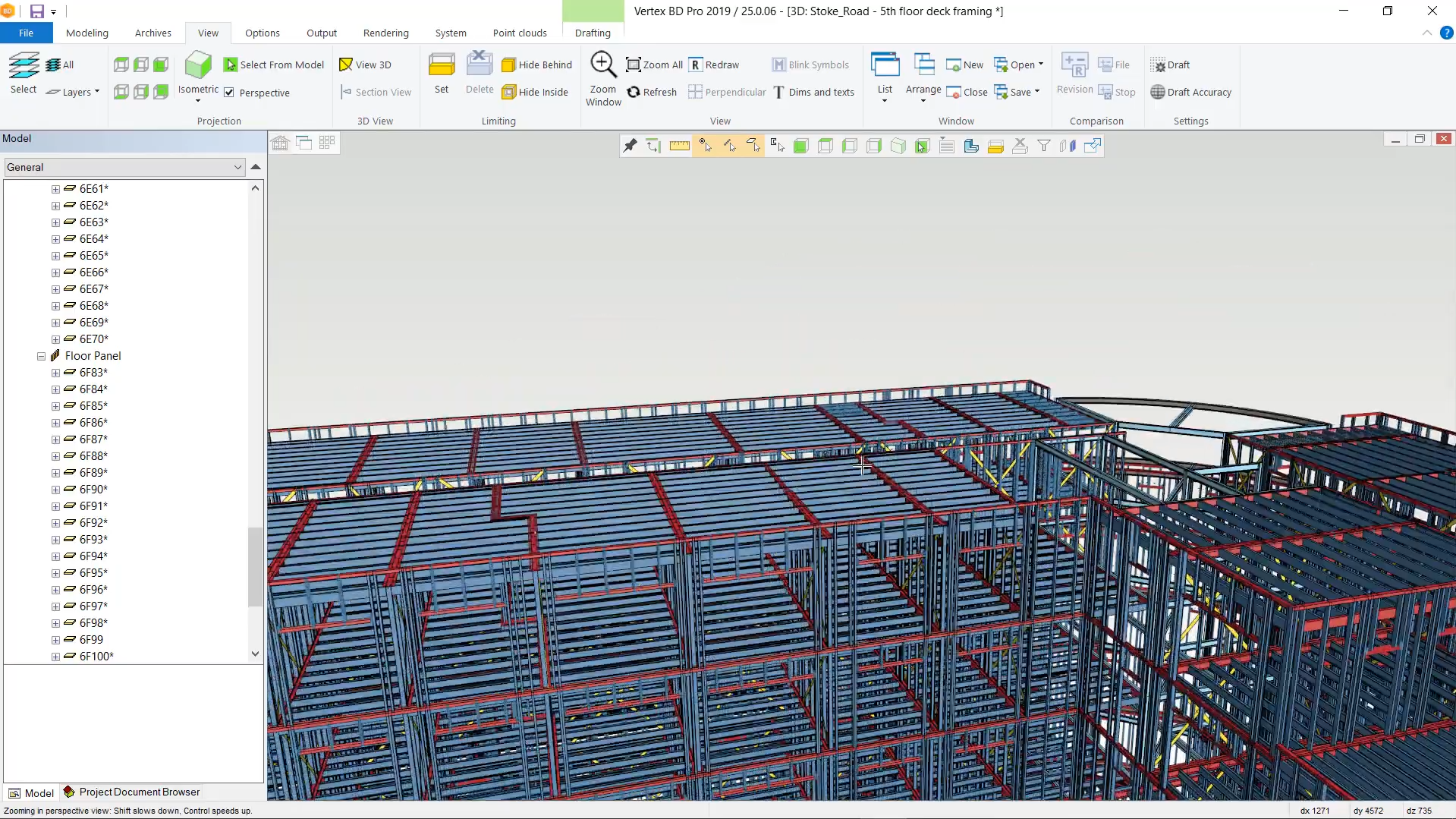
Cold-formed steel framing model in Vertex BD
Cold-formed steel framing model in Revit using Strucsoft MWF Pro metal by Graitec
Vertex BD framing models can be directly exported to CSV files and set to Knudson roll-formers and works only with the Knudson profiles. The structural framing model in Revit can then be exported into the ScotSteel software for performing engineering calculations as per the desired country code of practice as shown below.
Framing model in ScotSteel
Upon completion of the engineering calculations and the required layouts and fabrication drawings prepared using ScotLayout, the frames can then be sent to Scottsdale roll formers for production.
With regards to the Knudson series of roll formers, the structural framing model developed within Revit can directly be exported into CSV which can then be sent to the Knudson series of roll formers for production.
The Scottsdale Ecosystem offers end to end solution which includes frame modelling, structural analysis, design, layouts and all the way up to manufacturing of cold-formed steel frames in roll formers. With state-of-the-art machinery and bespoke software suite we offer a complete solution to help your construction business achieve new heights.
Click here to send us an enquire about your next framing project and we can be of assistance by providing the right choice of roll former and software.
